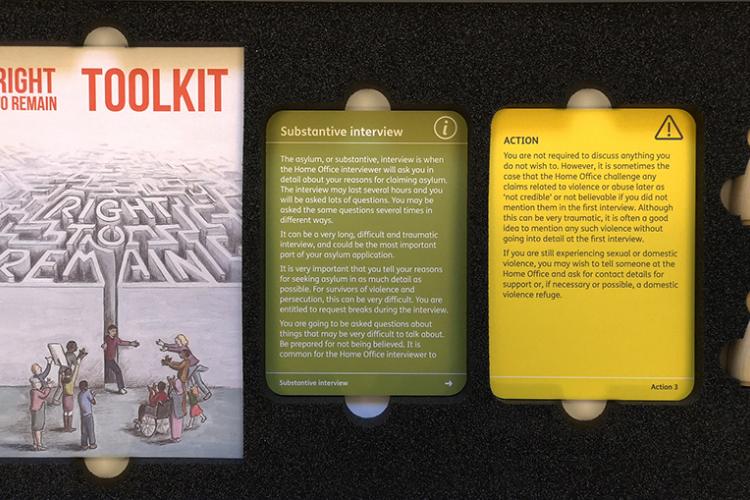‘I’m Just No Good’: The Right to Remain Asylum Navigation Board as a Tool for Collective Rights
Posted:
Time to read:
Post by Victoria Canning with Lisa Matthews. Victoria is senior lecturer in Criminology at the University of Bristol. She has recently completed an ESRC Research Leaders Fellowship focussing on harmful practice in asylum systems in Britain, Denmark and Sweden, and the gendered implication thereof. Her book Gendered Harm and Structural Violence in the British Asylum System won the 2018 British Society of Criminology book prize.

Just before summer, sitting on the floor of a room in the North West of England, Ala was showing scars on her arms from where her husband had burned her. It was not the first time a woman has shown me such scars, and it is unlikely to be the last. But beyond the pains evident on her body, one curious sentence struck a chord when she was speaking of her refusal for refugee status: ‘I didn’t give the right papers. I’m just no good’.
For some years, Lisa Matthews (coordinator at Right to Remain) and I have listened separately to people whose claims to asylum in the UK are refused and who blame themselves for their refusal. From entering the UK until decision or appeal, significant pressure is placed on individuals to ‘prove’ they are persecuted enough (and in the ‘right way’) to be considered a refugee. The cuts to legal aid and the introduction of measures to make it more difficult to access justice, such as changes to judicial review stopping forced removal and the introduction of ‘removal windows’ have made the asylum process ever more complicated and difficult to navigate successfully. We have often watched as people with little or no legal knowledge or training are expected to put together their own cases for appeals, as solicitors are ever stretched and support increasingly squeezed. The increased price of legal representation means some people – receiving less than £40 per week – are expected to cover their own legal costs. As I have written elsewhere, for some, this has meant making decisions between eating sufficient quality or amounts of food, or saving to fund their case. For others, this facilitates exploitative illegal work, which for women is disproportionately sexualised in nature.
There is no easy way to solve the problems faced by Ala and so many others. The now well-recognised ‘hostile environment’ orchestrated by the British state and often enacted by its corporate allies has been developed specifically to facilitate deterrence and deportation. As such, any remedy or resistance requires complex and sustained intervention in the long run.
It is at this intersection that Lisa and I opted for a short-term intervention to support the rights of people seeking asylum. How can we collectively ensure that people obtain accurate information in a way that enables a recognition that this is a system built to make gaining asylum difficult? With legal advice at its most sparse and prices for representation increasing, there are ever more ways for inaccurate information to drip through to people who are newly arrived and do not understand each step of the asylum process. Moreover, considering that inaccurate information can have devastating effects for a person’s claim to asylum, how do we enable correct information to be distributed from the offset?
It was from this starting point that the Right to Remain asylum navigation board has developed. The board acts as two things: firstly, it is a pedagogic tool for facilitators working with people seeking asylum (including people who have themselves been through the process) to outline each step of the system. Information cards align with colours, and the Right to Remain toolkit acts as a further guide for each stage. From there, each colour on the board aligns with cards highlighting potential problems and solutions.

Secondly, the board aims to work as a consciousness-raising tool. The words uttered by Ala, ‘I’m just no good’ are a manifestation of the individualising, dehumanising effects of the process of seeking asylum for many of the people who go through it. By bringing people together who have similar experiences, the board is a vehicle for discussion, mutual aid and collective recognition of the endemic issues embedded in the system itself. So often, we have seen the power of collectivity in the groups and friendships we have been involved with – when together, and with an opportunity to talk through the problems faced and solutions sought, there is more scope to de-individualise the issues so deeply embedded in the legal and formal process of seeking asylum in the UK.

*Note: The Right to Remain asylum navigation board has been funded by the ESRC, and developed by Dr. Victoria Canning (University of Bristol) and Lisa Matthews (Right to Remain). Free copies can be applied for by unfunded agencies, otherwise they can be purchased here. 100% of proceeds go to Right to Remain - this resource requires considerable funds to produce and we are asking funded organisations and groups to pay in order that the unfunded groups who contributed to the content can receive free copies. Whilst it is not a substitute for legal advice, it can be used to highlight the process of seeking asylum for people who are living in the system, and can be used as a pedagogic tool for students and organisations interested in the rights of people seeking asylum. The original Right to Remain toolkit can also be accessed here, with some sections in multiple languages.
Any comments about this post? Get in touch with us! Send us an email, or post a comment here or on Facebook. You can also tweet us.
__________
How to cite this blog post (Harvard style)
Canning, V. (2018) ‘I’m Just No Good’: The Right to Remain Asylum Navigation Board as a Tool for Collective Rights. Available at: https://www.law.ox.ac.uk/research-subject-groups/centre-criminology/centreborder-criminologies/blog/2018/12/im-just-no-good (Accessed [date])
Share:








